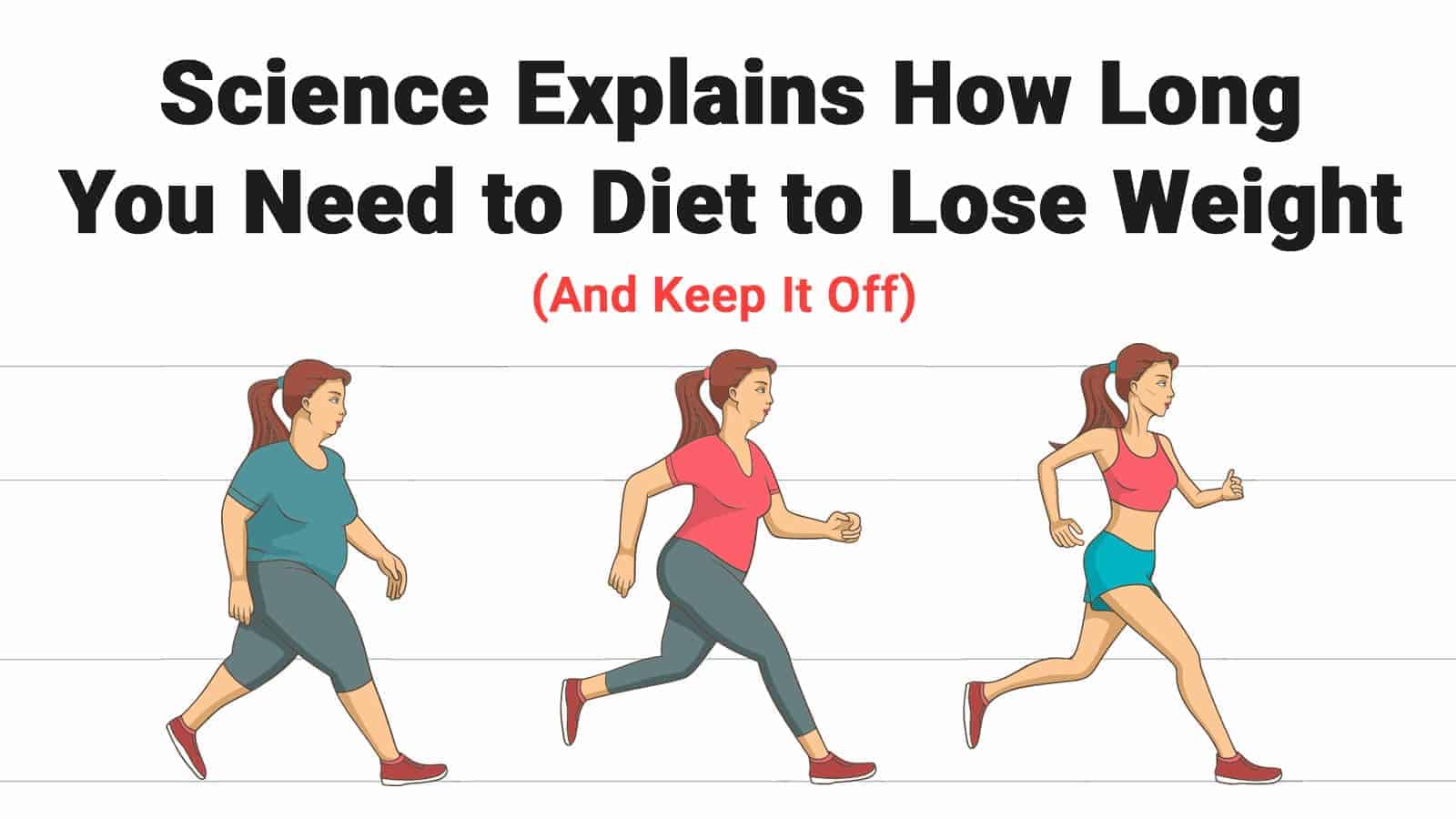Around the world, countless people are trying to lose weight. In fact, 45% of people in the United States had losing weight as their new year’s resolution in 2018. Many turn to diets of all sorts to achieve this goal.
But it’s more complicated than that. Diets take discipline, self-control, and knowledge in order to be pulled off correctly. This may be why 95% of all diets wind up failing and only 20% of overweight individuals who attempt to lose weight succeed in keeping it off.
Another key part of dieting is patience. If you’re too impatient in your efforts to lose weight, you may become discouraged too quickly and give up before you see visible results. To help motivate you, let’s consider what science says about how long you need to diet to lose weight and keep it off.
What Research Says About Dieting To Lose Weight
“A huge part of losing weight is believing you can do it and realizing it’s not going to happen overnight.” – Anonymous
In the University of Copenhagen, research on obesity and weight loss has been in full swing for almost two whole years. Recently, they successfully published a paper in the European Journal of Endocrinology that explained their findings.
The study involved 20 people classified as obese. They were placed on an eight-week diet that was low in calories to lose weight. Following this diet, these test subjects were to participate in a weight-maintenance regimen for a full year. During this period, they would meet with dieticians at regular intervals to get advice and track their progress.
Thrice during the period of the study, researchers took samples of the participants’ blood. This was done at the beginning of the study, after the dieting phase, and finally, after the year-long maintenance phase.
These samples were taken in order to examine the number of hormones responsible for hunger in the participants’ blood. Restrictive diets have a tendency to greatly increase these hormones, which is why so many diets fail and weight comes back on easily. This is the body’s way of fighting weight loss in order to keep you full and fed.
The collected samples revealed an impressive truth. After 12 months of maintaining their weight with dietician advice, the study participants had a dramatic hormone change. Instead of producing a lot of hunger-prompting hormones, they were producing more hormones that suppress appetite!
This means that this research has revealed a new, incredibly important finding. Dieting for two months and then working for a year to keep weight off is a reliable way to help the body reduce cravings and adjust to a new weight and eating habits!
What Type Of Diet?
All diets are calorie-restrictive in some way, but that’s often where the similarities end. There are so many different kinds of diets out there, and information on them is conflicting. Here’s a quick rundown of the most common types of diets people use to lose weight, how they work, and if they’re effective.
1. Low-Carb Diets
Arguably the most popular kind of diet to lose weight, these diets require practice to keep their carb intake low. This pushes the body to burn fats for energy since it cannot rely on carbs.
Studies have shown that eating low-carb is a great way to lose weight. It’s especially useful for those who are overweight. Without carbs to supply glucose for energy, the body turns stored fat into ketones, which provide the fuel it needs. This can make you feel less hungry and also reduces a lot of disease risk.
With that being said, those with Type 1 diabetes and lactating women should consult with a doctor before going low-carb, as doing so incorrectly can cause a near-fatal and very rare condition called ketoacidosis.
2. Paleo Diet
This diet helps individuals lose weight by making them revert to specific foods only. These foods are those that homo-sapien ancestors consumed before the advent of agriculture.
Many studies have suggested that the paleo diet can cinch the waist and cause good amounts of weight loss while lowering heart disease risk. It involves individuals eating mainly whole foods, fresh produce, and proteins to lose weight.
The diet has been proven to provide positive effects, but you will need to effectively make up for the loss of dairy and other food groups.
3. Dukan Diet
This diet focuses on high-protein intakes while restricting carbs. It works through the use of weight loss as well as weight maintenance phases. It requires the consumption of oat bran as well as any foods high in protein during weight loss phases and non-starchy veggies during maintenance phases.
Studies have shown that a calorie-restrictive Dukan diet can cause high levels of weight loss. Others have suggested this low-carb, high-protein diet has positive effects.
However, there are not enough studies on the Dukan diet specifically for it to be guaranteed. Severe calorie restriction, as shown in one Dukan diet study, might cause severe muscle loss alongside fat loss, which is not a great effect.
4. Vegan Diet
This diet involves cutting out all animal products and eating only plant products. It’s a very strict lifestyle change, but it may be good for weight loss. This is because the foods you can eat are typically more filling and lower in calories. Many on this diet don’t need to count calories at all!
However, the vegan diet – while proven to work – does not measure up to other diet methods. It does not promote weight loss as quickly, so if you’re impatient, it may not be the choice for you.
5. Intermittent Fasting
This form of dieting involves eating a reasonable amount of daily calories within a certain amount of hours. Then, the remaining hours of the day are spent drinking water and staying clear of food.
There are a variety of different intermittent fasting intervals to choose from, and plenty of studies suggest it works. It has positive metabolic effects and helps weight loss progress because practicers can’t eat several hours per day. However, speak to a doctor before choosing this method as some women, especially those with fertility issues, may have opposite results.
At the end of the day, it is recommended that you discuss diet changes with a doctor to see what works best for you. It can take a while to find a diet that fits your body. Be patient, keep your positive thinking, and talk to medical professionals for advice.
Other Factors That Affect How You Lose Weight
Weight loss is a fickle thing. There may be other factors affecting your weight loss progress. Here are some to keep in mind.
· Initial weight
If your BMI is in the range of obese, you lose weight much, much faster. Those who are already in a “healthy” weight range will typically lose weight more slowly.
· Exercise
Of course, exercise helps the body to burn calories. If you’re exercising while you’re on a diet, you’re likely to lose more weight at a faster pace. How much you’re working out will also change your progress.
· Carb consumption
Reducing the carbs in your diet causes water weight to come off. You will likely feel and appear slimmer and fitter, even though it’s just water.
· Diet
As mentioned previously, different types of diet will promote different weight loss speeds.
Extra Tips To Lose Weight
Sometimes, dieting restrictions alone can’t give you all the handy tips you need for weight loss. Here are some other things to keep in mind.
- Don’t skip fruits or vegetables. With low calories, barely any fat, tons of fiber, and heaps of minerals and vitamins, you want to include these in your diet plan.
- Eat loads of fiber. Food with fiber is filling, good for digestion, and usually pretty healthy.
- Stay hydrated. It’s common for people to feel hunger pangs when they’re actually just thirsty. Fill up on liquids often! Water has no calories.
- Don’t keep snacks. When you have unhealthy tidbits lying around, you’re likely to reach for them. Keep healthy alternatives in small amounts instead.
- Plan meals and eat them regularly. Set aside weekly time to write down your meal plan and only buy groceries to match it. Eat at set, regular times daily to boost your calorie burning efforts.
- Pay attention to labels. Before you buy anything at the store, read the labels. This will ensure that you truly know what you’re eating. Hidden ingredients and calories won’t creep up on you!
- Don’t skip breakfast. You’ll feel less energized, have trouble focusing, and feel more hungry throughout the day.
- Eat smaller portions, and eat slowly. Cut your usual portions in half and munch slowly to feel full faster. Use a smaller plate to trick your brain if you have trouble with this!
- Reduce alcohol intake. There are tons of calories in most alcoholic drinks, and barely any nutritional benefit! Cut down your alcohol consumption for best results.
- Don’t completely ban any foods. This will make your cravings much worse. Leave some caloric room to enjoy a treat every once in a while, or set a cheat day.
- Remember weight loss isn’t just about the scale. If you’re working out, you might lose fat but gain muscle. Don’t base everything on the scale. Base progress on how you feel (and how your clothes fit, too).
How To Keep Weight Off
When you lose weight successfully, you have every right to celebrate. But you still need to keep the extra pounds off! Here’s how to do so, easily according to WebMD:
- Don’t lose your good habits. When we diet, we build healthy habits and make good lifestyle changes. Don’t stop these just because the diet is over.
- Keep a food journal. Write down your food intake to keep track of what you eat and keep yourself aware.
- Don’t stop exercising. Even mild daily exercise can work wonders. Don’t discount the power of a workout!
- Drink enough water. Your body needs this to function properly, and a lack of water can cause unnecessary snacking.
- Stick to light, healthy meals. Just because the diet is over doesn’t mean you can go back to gorging on pizza. Eat whole, balanced meals. Get enough protein. Keep carbs and fat low. Eat your veggies. Be mindful about food!
- Sleep enough. A messed-up sleep schedule can screw up your metabolism and cause more hunger pangs as your body searches for energy.
- Weigh yourself. Weigh-ins every week can keep you aware of what’s going on with your body. This way, you won’t be taken by surprise when your jeans stop fitting again.
- Get support. Join a health or fitness community. Talk to your friends or family. Having people there to hold you accountable and help you through setbacks is crucial.
- Be ready for the occasional step backwards. A particularly busy or stressful week. A lavish vacation filled with food. A holiday spent with family. There are plenty of reasons you may regain a little weight, and that’s okay! Don’t lose hope! Maintain positive thinking! Return to your healthy habits and you’ll be back to where you want to be in no time.
Final Thoughts On How Long You Need To Diet To Lose Weight
Many people hope to lose weight, but without proper knowledge, they may never reach these goals. By paying attention to science and research, you’ll be able to diet intelligently and form positive habits. These will help you lose weight efficiently and effectively and keep it off in the long run.


















